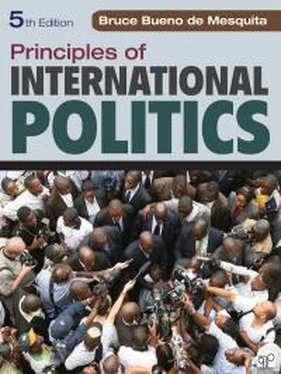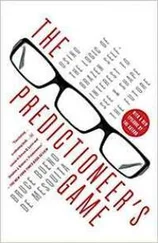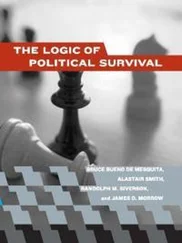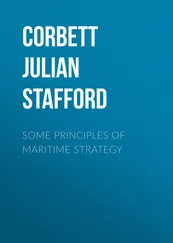Introduction

Leaders in democracies, like President Obama, generally get elected by winning support for their domestic policies but then they must go ahead and formulate foreign policies whether they were selected on that basis or not. Here we see President Obama campaigning among prospective Hispanic voters with whom his immigration policies gave him a significant edge over his Republican rival, Mitt Romney. With their support, he has won a second term in which he will need to confront economic and security problems all around the globe, many of which were not high on the list of priorities of his voters. All of international affairs is shaped by domestic political considerations.
OVERVIEW
We begin the study of international politics by outlining an approach to the field that differs from traditional ones: we focus on leaders and their constituents, not states.
Arrow’s theorem provides an explanation for why talking about the national interest or states as unitary actors is problematic and prone to important policy errors and mistaken explanations of patterns of international interactions.
National leaders are thought here to be motivated by personal, not national, interests. Their foreign policy decisions are constrained by domestic politics as much as they are by forces external to the nation.
Yet, whatever their policy preferences, leaders must coordinate their foreign policy actions with other leaders and rivals, both domestic and foreign.
The study of international relations may best be understood as the individually motivated strategies that shape war, peace, and world order.
Assumptions Check
Before we even get started, let’s take a moment to have fun with some facts. Try answering the next five questions. They will give you a peek into how to think about international politics:
1.
It is a fact that about 70 percent of the time when a country with allies is attacked, the allies don’t come to their partner’s aid. With this fact under your belt, which do you think is more likely?
a.
Alliances are unreliable.
b.
Alliances are reliable.
2.
Protecting American workers from unfair foreign competition (in which foreign goods are sold more cheaply than their cost) __________.
a.
increases employment in the United States
b.
decreases employment in the United States
3.
When power is balanced between rivals, war is __________.
a.
more likely
b.
less likely
c.
neither more nor less likely
4.
If we had a worldwide agreement to reduce greenhouse gas emissions, then we would see __________.
a.
significant compliance and a significant decrease in greenhouse gas emissions
b.
significant compliance and little decrease in greenhouse gas emissions
c.
little compliance and little decrease in greenhouse gas emissions
5.
Giving government-to-government foreign aid __________.
a.
improves the quality of life for the poor in poor countries
b.
decreases the quality of life for the poor in poor countries
Okay, we’ve had some stuff to think about. The rest of this book is about establishing why these answers are the right answers, and we’ll see lots more puzzles and solutions besides.
See end of chapter for answers.
International politics is about war, peace, and world order. These three categories may seem straightforward enough, but they are fraught with complications. Everyone says they are against war and for peace, yet war happens (although with less frequency than in the past) and the peace of ordinary citizens in places like North Korea, Zimbabwe, or Cuba is no bed of roses. Everyone says they want an orderly, predictable world, yet the world of international affairs looks messy and even chaotic. Questions about the causes and impediments to war, peace, and world order frame three important sections of this book just as they form the major subjects of international politics, and, for that matter, of all politics. But before we can tackle those topics, we need some ways to organize our thoughts about them, which we acquire in this first, foundations section of the book. Then we can analyze why things happen the way they do whether the subject is war, peace, or world order.
We examine really carefully what the causes and consequences of war are. In doing so, we recognize that war and lesser uses of force reflect a breakdown of peace, but they can also represent the necessary foundation for establishing an enduring peace. War is a poor way to settle differences, but the peace imposed by Hitler surely would have been even worse. War is, indeed, hell, but sometimes it is not possible to justify peace over war. So being for peace—who isn’t—and being against war is not quite the same thing.
There are two really big questions about war that need to be answered. First, why do wars happen? After all, if belligerents knew how a war will turn out, they could always strike a deal beforehand that gives both sides the same results as they will get from fighting, and they could avoid the bloodshed and destruction of combat. Second, are there winners and losers in wars, or is everyone a loser? Here we will see that while war has many losers often there are a few winners and those few winners tend to be government leaders. We will see that too often national leaders don’t seem to mind putting their people at risk for their own personal political gains. The implications behind the answers to these two big questions can sometimes be powerfully unsettling—as we will see.
After sorting through questions about war, we evaluate international affairs during times of relative peace. Here it is useful to recognize that war and peace are a continuum and not two completely distinct circumstances. During relatively peaceful times, governments can put more energy into thinking about the policies they will follow to foster trade and to stimulate business and industry at home. Of course, the policies that advance business at home may be at odds with the policies that promote trade and so government leaders have to work out how much they wish to emphasize one means to promote prosperity at the expense of the other. And sometimes solving problems about trade-offs in times of peace are the causes of subsequent wars.
Peacetime also offers the opportunity to shore up friendships or forge shared interests among former adversaries in the hope of promoting future peace and prosperity. It is a time to establish laws and norms of conduct to secure the prospects of continued peace but also to address differences that might lead to future conflict. During periods of relative peace, there is an enhanced opportunity to encourage respect for fundamental human rights and civil liberties and equally, by some, an opportunity to resist pressure to adhere to norms of good conduct toward other nations and one’s own citizens. Some governments duck hard problems by turning responsibility for them over to international, multilateral organizations like the United Nations, the International Monetary Fund, or the Asian Development Bank, and sometimes these organizations come up with compelling ways to address hard problems. When they do, it can prove easier for the leadership in any country to go along with externally suggested norms than it is for them to establish those norms at home in the first place. We will try to understand when international organizations can help promote the very peace and order that individual governments have failed to impose, and we will try to understand when and why such efforts, as with global warming thus far, have failed.
Читать дальше













